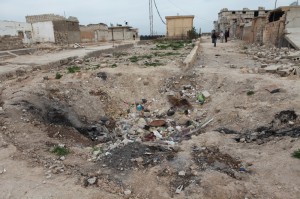By Anders Corr, Ph.D.
The US and NATO could be pursuing a strategy of adding fuel to the fire in Syria. The Government of Syria has been allied with Iran, and irritated the US and NATO from a nonproliferation perspective, for a long time. The US has consequently wanted to destabilize the Syrian Government. Now, that wish has been met. The Syrian Government is in a counterinsurgency against rebels that are closely allied with Al Qaeda. Other than humanitarian considerations, the US and NATO should be quietly overjoyed that two enemies are fighting.
When two enemies of the US and NATO fight, it decreases the power of both enemy forces. It leeches resources and attention that could otherwise be directed against the US and NATO. Such a strategy has plenty of historical precedent. US ambiguity towards and/or support of conflicts between enemies occurred in the 1970s conflict between the Soviets and China, and in the 1980s conflict between Iraq and Iran.
Insurgent financial requirements are far cheaper than counterinsurgent financial requirements. One dollar of insurgent budget can cost counterinsurgents thousands of dollars to maintain a parity of forces. For every dollar of materiel supplied by the US and NATO to the rebels, the Government of Syria, along with its allies Iran and Hezbollah, would need to spend thousands of dollars to maintain a balance of forces with the insurgents. Especially considering the greater financial resources of the US and NATO as compared with Syria, Iran,and Hezbollah, this is a winning strategy for the US and NATO in the region.
To keep the conflict going requires restraint and regulation. Too much support to rebels may allow them to win, which would be a failure of US/NATO strategy given that the rebels are closely affiliated with Al Qaeda. Alternatively, too little support could lead the Syrian Government to win, which would be a victory for Iran and Hezbollah, and end the flow of Islamist militants to their demise on the battlefields of Syria.
Such a strategy of adding fuel to the fire in Syria requires some ambiguity on the part of the US and NATO as to goals. Ambiguity is good for the US and NATO because it avoids negative public opinion in both Islamic countries and among western voters that might result from such a Machiavellian military strategy. Ambiguity with respect to Syria is, in fact, exactly what the US and NATO seem to be settling upon.
Keeping the Syrian conflict burning has definite negative consequences. It is a humanitarian disaster that costs lives and produces poverty and refugees. The chaos that results from such a conflict may allow sophisticated or chemical weaponry to fall into the hands of terrorists. However, humanitarian concerns are often ignored by decision-makers at times of war, and the risk of loss of Syrian materiel may seem worth the assured costs imposed on Iran, Hezbollah, and Al Qaeda.
Update: Closed-door briefings by top administration briefings in the last week confirs the administration strategy of adding fuel to the fire. The Wall Street Journal reported that in these briefings, the White House indicated that they want to strengthen the opposition, but not enough to allow them to prevail. “The administration,” according to the Wall Street Journal, “doesn’t want U.S. airstrikes, for example, tipping the balance of the conflict because it fears Islamists will fill the void if the Assad regime falls” (WSJ). Updated 9/3/2013.
JPR Blog

